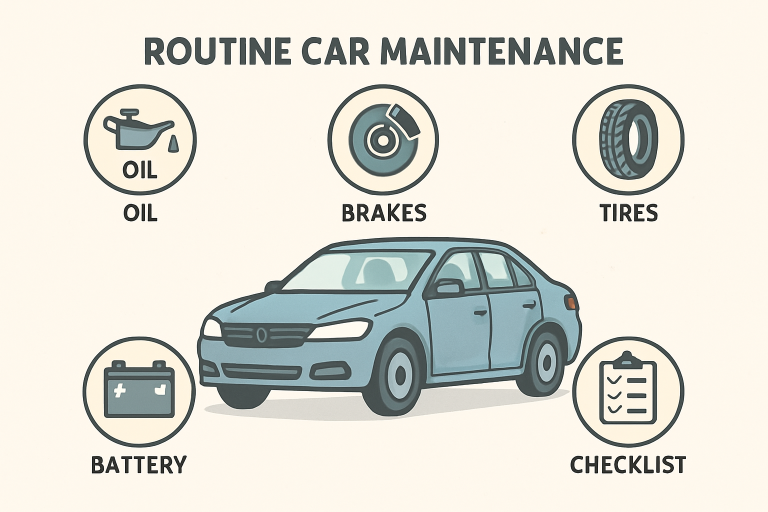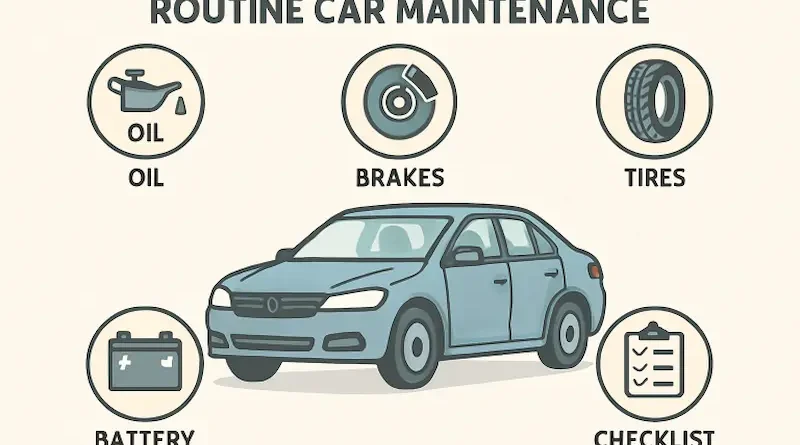How Routine Car Maintenance Can Save You Time and Money
Why Routine Maintenance Matters
Routine car maintenance is more than an item on your to-do list—it’s essential for keeping your vehicle running reliably and avoiding unforeseen expenses. Addressing simple needs like changing the oil or rotating your tires can make a significant difference in both the performance and longevity of your car. In fact, many unexpected repairs can be prevented entirely by sticking to a regular maintenance schedule.
Relying on professional care from a certified Toyota service center provides peace of mind. These centers are staffed by knowledgeable technicians who use specialized equipment to assess and service your vehicle, ensuring that even subtle issues are detected early. This proactive approach not only saves you money in the long run but can also spare you the stress and inconvenience of unexpected breakdowns.
Maintaining your vehicle ensures safety and longevity. Neglected maintenance can cause serious issues affecting braking, handling, and safety features. Consumer Reports shows that regular services like oil changes and brake inspections protect your investment and extend your vehicle’s life. For Toyota owners, routine oil changes, filter replacements, tire rotations, and brake inspections at certified centers help preserve warranty coverage and maintain dealership value. These tasks enhance vehicle health, fuel efficiency, and driving quality. Finding a reputable dealership with expert teams can offer tailored service schedules, from inspections to repairs, ensuring your car remains reliable and safe in the long term.

Key Maintenance Tasks for Every Driver
- Oil and Filter Changes: These are crucial for keeping your engine lubricated and running efficiently. Most vehicles require an oil change every 3,000 to 5,000 miles, but always consult your owner’s manual for manufacturer recommendations.
- Tire Pressure and Rotation: Regularly checking tire pressure increases safety and ensures even tread wear. Rotating your tires every 6,000 to 8,000 miles helps them last longer and improves fuel economy.
- Brake Inspection: Reliable brakes are essential for safety. Have your brake pads, rotors, and fluid levels inspected during regular service appointments.
- Fluid Top-Offs: Make sure fluids like coolant, transmission, and windshield washer fluid are always at the right levels. Neglecting these simple checks can lead to serious mechanical problems.
- Battery Check: A dead battery is a leading cause of roadside breakdowns, especially in extreme weather. Test your battery during scheduled maintenance to avoid getting stranded.
Adhering to this list will keep your vehicle operating efficiently, extend its life, and help catch small problems before they become expensive repairs. If you’re looking for a reliable Toyota dealership near me, making these checks a habit—many take just a few minutes but can save hours of trouble down the road—can help ensure your vehicle stays in top shape. Regular maintenance checks also provide peace of mind during your drives, knowing that your car is in good condition. Additionally, staying on top of these inspections can preserve your vehicle’s resale value over time.
Common Misconceptions About Car Care
It’s easy to underestimate the importance of routine car care, especially with advancements in modern vehicle technology. One common misconception is that newer models are immune to wear and tear, but skipping regular maintenance can still result in costly issues or voided warranties. Another myth is that premium fuel or additives are enough to keep an engine clean; in reality, regular services like oil changes make a more substantial impact on vehicle longevity and performance.
Some drivers also believe that a check engine light indicates a minor issue, yet ignoring this can allow serious engine problems to develop unnoticed. Preventative maintenance, conducted at trusted service centers or dealerships, ensures any warning signs are addressed early, reducing long-term risks and expenses.
How to Create Your Own Maintenance Schedule
Crafting a personalized maintenance schedule isn’t difficult, and it pays for itself by helping you avoid emergencies. Start by reviewing your owner’s manual for manufacturer recommendations, especially regarding service intervals for essential tasks like oil changes and tire rotations. Then, factor in local climate conditions and your driving habits—frequent short trips, towing, or extreme temperatures can necessitate more frequent checks.
- Take notes or use an app to track completed services and set reminders for future appointments.
- Choose a calendar system you’ll reliably check—digital reminders work well for most busy drivers.
- Keep receipts and service logs; these records not only help you stay on top of maintenance but also add value when it’s time to sell your vehicle.
By maintaining an organized schedule, you can avoid unexpected mechanical failures and costly repairs.
Benefits of Regular Checkups
Scheduled vehicle checkups do more than prevent problems—they pay dividends over time. Well-maintained vehicles retain more value, attract higher resale offers, and run more efficiently. According to insights from Edmunds, vehicles with comprehensive maintenance records typically command better prices on the used market.
Additionally, regular inspections can identify developing issues early, helping you avoid breakdowns at inconvenient times. Over the years, investing a little time and money in checkups translates to significant savings, less stress, and more confidence on every drive.
Top Reasons Cars Break Down
- Dead or weak batteries are often caused by age or extreme temperatures.
- Flat or poorly inflated tires from neglected checks or worn-out treads.
- Overheating due to low coolant levels or failing radiators.
- Broken timing belts can cause catastrophic engine damage.
- Ignoring basic maintenance, like oil changes, can lead to internal engine problems.
Fortunately, most breakdowns are preventable with routine care. Regular inspections and proactive maintenance allow you to address minor issues before they become major headaches.
Choosing a Trusted Service Center
Selecting a reputable service provider is essential for effective car care. Look for centers with certified technicians, transparent pricing, and consistently positive reviews. A trusted service center will keep you informed, document maintenance thoroughly, and ensure you always understand what’s being done—never pressuring you into unnecessary repairs. Recommendations from friends, community groups, and reliable online platforms help narrow down the top choices. Always prioritize shops with proven experience servicing your specific make and model.
DIY vs. Professional Maintenance: What You Should Know
Some maintenance tasks, such as replacing windshield wipers or topping off washer fluid, are simple projects you can tackle at home with minimal tools. However, complex repairs—like brake work, diagnostics, or timing belt replacement—should be left to professionals. Consider your own comfort level, experience, and access to proper tools before attempting anything beyond basic upkeep. Professional technicians possess the expertise and equipment to complete complex jobs efficiently and safely, thereby safeguarding both your vehicle and your warranty.
Conclusion
Regular car maintenance may feel like a small commitment, but it delivers long-term rewards in reliability, safety, and cost savings. By addressing minor issues early, drivers can prevent expensive repairs, extend their vehicle’s lifespan, and avoid unexpected breakdowns. Ultimately, a consistent maintenance routine is not just about caring for your car—it’s about protecting your time, your budget, and your peace of mind.
Visit the rest of the site for more interesting and useful articles.

